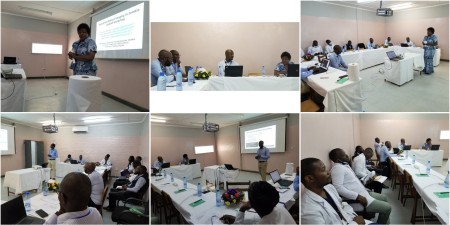- Log in to post comments

A one-day workshop was held at the University Teaching Hospitals in Lusaka Zambia on March 6, 2023 to formally launch the “Exploring the Use of Enterprise Medical Imaging (EMI) and Artificial Intelligence (AI) for Efficient and Effective Radiological Workflows in Public Health Facilities in Zambia” project.
The goal of the workshop was to discuss details of project Work Packages with potential beneficial partners in order to identify potential areas of collaboration.
The workshop had participants from The University Teaching Hosptails, The Ministry of Health, Centre for Infectious Disease Research in Zambia, The University of Zambia and The University of Cape Town.
The project is as a result of a generous Google Research grant, through their Award for Inclusion Research (AIR) Program [1, 2]. In addition, the project will run between March 2023 and March 2024.
About The Enterprise Medical Imaging Project in Zambia
The public health sector in Zambia, which primarily provides health services to underserved communities, has a deficit of qualified radiologists, with a report of nine (9) radiologists servicing a population of 18 million individuals, as of 2021 (Bwanga et al., 2021) [3]. This shortfall poses a number of challenges with requisition, acquisition and interpretation of medical images. Coupled with this problem is the fact that recent years have seen a rise in the type of medical imaging modalities used in the health sector, including an exponential growth of medical imaging data requiring interpretation.
This funded project is aimed at exploring the use of Enterprise Medical Imaging strategies and Artificial Intelligence (AI) techniques in addressing radiological workflow challenges experienced in public health facilities in Zambia. Specifically, the project will be aimed at utilising AI-inspired techniques that emphasise the human-in-the-loop approach to (i) effectively store and manage medical images and radiological reports with interoperability in mind; (ii) explore the feasibility of semi-automated approaches to the interpretation of medical images and, additionally, (iii) explore the feasibility of automated generation of radiological reports.
Bibligraphy
[1] Google Research. (n.d). Award for Inclusion Research Program. https://research.google/outreach/air-program
[2] DataLab Research Group. (2023, January 7). Google Research Award to Explore Use of Artificial Intelligence and Enterprise Medical Imaging for Effective Radiological Workflows in Zambia. https://datalab.unza.zm/articles/google-research-award-explore-use-artificial-intelligence-and-enterprise-medical-imaging
[3] Bwanga, O., Sichone, J. M., Sichone, P. N., & Kazuma, Y. B. (2021). Image interpretation and reporting by radiographers in Africa: findings from the literature review and their application to Zambia. Medical Journal of Zambia, 48(2), 125-135. URL: https://mjz.co.zm/index.php/mjz/article/view/877